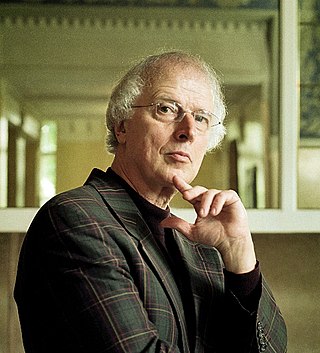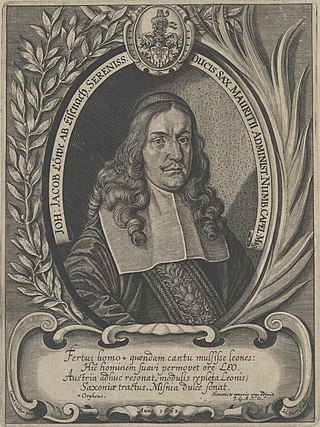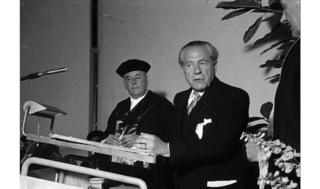Related Research Articles
Werner Egk, born Werner Joseph Mayer, was a German composer.
Harry Alfred Robert Kupfer was a German opera director and academic. A long-time director at the Komische Oper Berlin, he worked at major opera houses and at festivals internationally. Trained by Walter Felsenstein, he worked in the tradition of realistic directing. At the Bayreuth Festival, he staged Wagner's Der fliegende Holländer in 1978 and Der Ring des Nibelungen in 1988. At the Salzburg Festival, he directed the premiere of Penderecki's Die schwarze Maske in 1986 and Der Rosenkavalier by Richard Strauss in 2014.

König Hirsch is an opera in three acts by Hans Werner Henze to a German libretto by Heinz von Cramer after Il re cervo, a theatrical fable (1762) by Carlo Gozzi. He revised it as Il re cervo, premiered in 1963 at the Staatstheater Kassel.

Udo Zimmermann was a German composer, musicologist, opera director, and conductor. He worked as a professor of composition, founded a centre for contemporary music in Dresden, and was director of the Leipzig Opera and the Deutsche Oper Berlin. He directed a contemporary music series for the Bayerischer Rundfunk and a European centre of the arts in Hellerau. His operas, especially Weiße Rose, on a topic he set to music twice, have been performed internationally, and recorded.

Ferdinand Leitner was a German conductor. Leitner studied under Franz Schreker, Julius Prüwer, Artur Schnabel and Karl Muck.

Doktor Faust is an opera by Ferruccio Busoni with a German libretto by the composer, based on the myth of Faust. Busoni worked on the opera, which he intended as his masterpiece, between 1916 and 1924, but it was still incomplete at the time of his death. His pupil Philipp Jarnach finished it. More recently, in 1982, Antony Beaumont completed the opera using sketches by Busoni that were previously thought to have been lost. Nancy Chamness published an analysis of the libretto to Doktor Faust and a comparison with Goethe's version.
Faust has inspired artistic and cultural works for over four centuries. The following lists cover various media to include items of historic interest, enduring works of high art, and recent representations in popular culture. The entries represent works that a reader has a reasonable chance of encountering rather than a complete catalog.

Barry McDaniel was an American operatic baritone who spent his career almost exclusively in Germany, including 37 years at the Deutsche Oper Berlin. He appeared internationally at major opera houses and festivals, and created roles in several new operas, including Henze's Der junge Lord, Nabokov's Love's Labour's Lost, and Reimann's Melusine. He was also a celebrated concert singer and recitalist, focused on German Lied and French mélodie. He was the first singer of Wilhelm Killmayer's song cycle Tre Canti di Leopardi. He recorded both operatic and concert repertory.

Joseph Haas was a German late romantic composer and music teacher.
June Card is an American soprano and stage director who had an active career in operas and concerts from 1959 through today. She began her career as a chorus girl on Broadway before moving into opera.

Johann Jacob Löwe (1628–1703) was a German Baroque composer and organist at Eisenach.
Hermann Reutter was a German composer and pianist who worked as an academic teacher, university administrator, recitalist, and accompanist. He composed several operas, orchestral works, and chamber music, and especially many lieder, setting poems by authors writing in German, Russian, Spanish, Icelandic, English, and ancient Egyptian and Greek, among others.

Bluthochzeit is an opera in two acts by Wolfgang Fortner. The libretto, also by Fortner, is based on Enrique Beck's German translation of García Lorca's 1933 play Bodas de sangre. It premiered at the Cologne Opera on 8 June 1957.
Tatjana Gürbaca is a German opera director.
Iris Vermillion is a German operatic mezzo-soprano. A member of the Deutsche Oper Berlin from 1988, she has enjoyed an international career, appearing in Amsterdam with Nikolaus Harnoncourt and at the Salzburg Festival, among others.
Johannes Martin Kränzle is a German baritone in opera and concert who has made an international career. For years a member of the Oper Frankfurt, he was chosen as Singer of the Year in 2011 after creating the leading role in Wolfgang Rihm's Dionysos at the Salzburg Festival. He made his debut at the Royal Opera House as Don Alfonso in Mozart's Così fan tutte, and at the Bayreuth Festival as Beckmesser in Wagner's Die Meistersinger von Nürnberg in 2017.
Bohumil Herlischka was a Czech opera director. After years at the National Theatre, he worked from 1957 predominantly in German opera houses, introducing a style later known as Regietheater. He directed several productions at the Oper Frankfurt and developed a close connection to the Deutsche Oper am Rhein where he staged operas by Leoš Janáček, presenting a cycle of six operas in the 1977–78 season. He staged Schoenberg's Moses und Aaron at the Hamburg State Opera, including a tour to Israel. He focused on rarely played works such as Meyerbeer's Le prophète at the Deutsche Oper Berlin and on contemporary opera such as Shostakovich's Lady Macbeth of the Mtsensk District and the world premiere of Alexander Goehr's Behold the Sun.

Ludwig Strecker Jr., also Ludwig Strecker der Jüngere, was a German music publisher, and an author of opera librettos which he wrote under the pen name Ludwig Andersen. He authored, and published through the Schott publishing house, two of the most successful German contemporary operas of the 1930s, Egk's Die Zaubergeige and Reutter's Doktor Johannes Faust.
Peter Lagger was a Swiss bass in opera and concert. He was a member of European opera houses, finally the Deutsche Oper Berlin, and appeared as a guest internationally. He took part in world premieres such as Louise Talma's Die Alkestiade at the Oper Frankfurt, and Henze's Die Bassariden and Penderecki's Magnificat, both at the Salzburg Festival.

Claus Guth is a German theatre director, focused on opera. He has directed operas at major houses and festivals, including world premieres such as works of the Munich Biennale, and Berio's Cronaca del luogo at the Salzburg Festival in 1999. Guth is particularly known for his opera productions of the works of Richard Wagner and Richard Strauss. He has received two Faust awards, for Daphne by Richard Strauss in 2010, and for Debussy's Pelléas et Mélisande, both at the Oper Frankfurt.
References
- 1 2 3 4 5 "Doktor Johannes Faust". Schott Music (in German). Retrieved 2 May 2020.
- ↑ "Doktor Johannes Faust nach dem Puppenspiel / von Karl Simrock. Hrsg. von Wilhelm Stapel". Herzogin Anna Amalia Bibliothek (in German). Retrieved 2 May 2020.
- 1 2 Griffel, Margaret Ross (2012). Operas in English: A Dictionary. Scarecrow Press. pp. 101–102. ISBN 978-0-81-088325-3.
- 1 2 3 Levi, Erik (1996). Music in the Third Reich. Springer-Verlag. p. 162. ISBN 978-1-34-924582-6.
- ↑ "Reutter, Hermann". Frankfurter Personenlexikon (in German). Retrieved 2 May 2020.
- ↑ "Oper Graz / 1940-1949". Graz Opera (in German). Retrieved 9 May 2020.
- ↑ Kutsch, K.-J.; Riemens, Leo (2012). "Schütz, Alfred". Großes Sängerlexikon (in German) (4th ed.). Walter de Gruyter. p. 4286. ISBN 978-3-59-844088-5.
- ↑ "Hermann Reutter – Doktor Johannes Faust (2 CDs)". vocal-classics.com (in German). Retrieved 9 May 2020.
- ↑ "Variations of the Faust Myth / A Chronological, International Overview". aix1.uottawa.ca (in German). 2005. Archived from the original on 8 March 2013. Retrieved 9 May 2020.